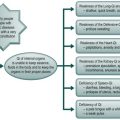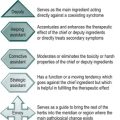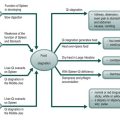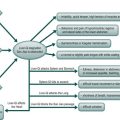4. Syndrome of Liver-blood deficiency
Manifestations
Main symptoms
Dizziness, dry eyes, blurred vision, cramping and stiffness of muscles and joints, tingling or numbness of limbs, insomnia, dream-disturbed sleep and dull-pale complexion.
Secondary symptoms
Thin and brittle nails, dry and itchy skin, dry nasal cavities, constipation, scanty menstruation, amenorrhea or irregular menstruation, infertility, anger and depression.
Tongue
Pale with a thin white coating.
Pulse
Thready, or thready and wiry, particularly on the left side.
Associated disorders in western medicine
Various types of anemia, malnutrition, hypotension, dysfunctional uterine bleeding, infertility, thrombocytopenia, heavy blood loss after a surgical operation or delivery of a baby, mental disorders.
Analysis of the syndrome
• The Liver stores blood and regulates the quantity of blood in the blood circulation. If the Liver-blood is too weak to nourish its orifice, dizziness, dry eyes and blurred vision may exist.
• When the blood is too weak to circulate and nourish the tendons, numbness, tingling of the muscles, stiffness or cramp of the joints and thin and brittle nails may present.
• When the blood is unable to nourish the skin, the mucus and the intestines, dry and itchy skin, dry nasal cavities and constipation may occur.
• The Liver houses the Hun (soul), which is active in sleep. If the Liver-blood is deficient, restless sleep and dream-disturbed sleep often exist.
• Menstruation is supported by sufficient blood. If the blood is deficient, scanty menstruation, amenorrhea or irregular menstruation may present. If the blood is too weak to nourish the fetus, infertility and miscarriage may occur.
• If the blood cannot flow vigorously, there may be a thready pulse. When the blood is too weak to move, Qi stagnation is often present – the pulse is then not only thready, but also wiry. Patients may suffer from emotional disturbances such as depression, anger and irritability, or hypochondriac distension and pain.
(See Figure 5.4 on page 189 .)
Treatment principle: Nourish the Liver-blood; promote the free flow of Liver-Qi and the smooth circulation of blood
Herb selection principles and formula composition strategies
• First, herbs that enter the Liver meridian and are able to tonify the Liver-blood directly are selected.
• Second, herbs that enter the Kidney meridian and tonify the Kidney-essence in order to tonify the Liver-blood indirectly are often selected.
• Third, sour and astringent herbs which can soften the Liver, relax the tendons and moisten the dryness are selected.
• Finally, herbs that promote the Qi and blood circulation are selected.
Structure of the formula and selection of herbs
Chief: Tonify the Liver-blood directly
Dang Gui ( Angelicae sinensis radix) and Bai Shao Yao ( Paeoniae radix lactiflora)
Dang Gui is sweet, pungent and warm, and enters the Liver meridian. It is the commonly used herb to tonify the Liver-blood as it enters the Liver meridian primarily and tonifies the blood directly. Along with herbs that tonify the Kidney-essence, its function of tonifying the Liver-blood becomes stronger. The strong point of this herb is that it not only tonifies the blood, but also promotes the blood circulation as it has pungent and warm properties. It matches the nature of blood, which prefers warmth and must always be moving.
Bai Shao Yao is bitter, sour and slightly cold. It enters the Liver and Spleen meridians. Its sour and cold property can nourish the Yin directly and generate the substantial part of the blood. It is particularly effective for softening the Liver, thereby relieving cramp of the muscles and tendons. It can also effectively moisten the internal organs and the orifices, so it can treat the symptoms of dryness of skin and eyes caused by Liver-blood deficiency.
Dang Gui and Bai Shao Yao are very often used together as a pair of herbs in the formula, as Dang Gui concerns the functional aspect of blood and Bai Shao Yao concerns the substantial aspect of blood. The former is called a Yang herb and the latter a Yin herb in this situation. They can effectively treat Liver-blood deficiency.
Shu Di Huang ( Rehmanniae radix praeparata)
Shu Di Huang is sweet and slightly warm, and enters the Kidney and Liver meridians. As it is able to tonify the Kidney-essence and the Liver-blood directly, the function of tonifying the blood is quite strong. It is often used as chief in the formula for serious conditions of blood and essence deficiency, such as in those with a poor constitution, retardation of children and degeneration in elderly people. In the formula, this herb should be used with some herbs that regulate the Qi in the Middle- and Lower-Jiao to reduce its rich and heavy nature.
Deputy: Nourish the Kidney-essence
Gou Qi Zi ( Lycii fructus) and He Shou Wu ( Polygoni multiflori radix)
These two herbs enter the Kidney and Liver meridians. They are able to tonify the Kidney-essence and Liver-blood. Unlike Shu Di Huang ( Rehmanniae radix praeparata) they are not heavy and cloying in nature, thus they may not bring about the problem of digestion. For this reason, they are often used in formulas to enhance the ability of the chief herb to tonify the Liver-blood.
Assistant: Treat the symptoms caused directly by blood deficiency
Ji Xue Teng ( Spatholobi caulis et radix)
Ji Xue Teng is bitter, slightly sweet and warm, and enters the Kidney and Liver meridians. It is a special herb for tonifying the blood as it is also able to promote the blood circulation and relax the tendons. It is therefore selected in formulas to relieve stiffness, tingling, numbness, pain and an uneasy feeling in the body, such as in Bi syndrome and in restless leg disorder due to blood deficiency with Qi and blood stagnation.
Mu Gua ( Chaenomelis fructus)
Mu Gua is sour and warm, and enters the Liver and Spleen meridians. It has no function to tonify the blood, but is able to nourish the tendons, expel dampness and open the meridians. It is selected in formulas to relieve spasm and stiffness of the limbs due to Yin and Liver-blood deficiency.
Suan Zao Ren ( Ziziphi spinosae semen)
Suan Zao Ren is sweet, sour and neutral, and enters the Liver, Gall Bladder and Heart meridians. Since sweet and sour may generate the Yin and stabilize the body fluids, it is also able to nourish the Liver blood. It is a perfect herb to calm the mind and improve sleep. It is often selected in the formula to treat anxiety, sweating, restless sleep and dream-disturbed sleep due to Liver-blood deficiency.
Bai Shao Yao ( Paeoniae radix lactiflora) and Zhi Gan Cao ( Glycyrrhizae radix preparata)
The function and characteristics of Bai Shao Yao have been discussed in the chief herbs. Because it is a sour and cold herb, and is able to generate and stabilize the Yin and body fluids, it is often used as an assistant to relieve muscle cramp. If it is used with Zhi Gan Cao, the function of smoothing the muscles and treating cramping pain is increased.
Dang Gui ( Angelicae sinensis radix) and Chuan Xiong ( Chuanxiong rhizoma)
The tonifying function of Dang Gui has been discussed in the chief herbs. As Dang Gui also has the function of promoting the blood circulation, it is used as an assistant to regulate the blood circulation. It is mainly selected in formulas to treat dysmenorrhea, amenorrhea, tingling and numbness of the limbs that are caused by deficiency of blood and slowing down of blood circulation.
Chuan Xiong is pungent, bitter and warm, and enters the Liver, Gall Bladder and Pericardium meridians. It has no tonifying function, but is characterized by its ability to move the Qi in the blood. Since its moving speed and strength are high, it is able to reach to any part of the body and is effective in relieving pain caused by Qi and blood stagnation. A small amount of Chuan Xiong may be used as an assistant in the formula that tonifies the Liver-blood to reduce the stagnation of blood caused by deficiency. It is particularly effective for treating hypochondriac pain, stiffness, and tingling and numbness of the muscles due to Qi and blood stagnation.
Xiang Fu ( Cyperi rhizoma)
Xiang Fu is a very commonly used herb to regulate the Liver-Qi. It is pungent, sweet, slightly bitter and warm, without a harsh and drying nature. It enters the Liver and San Jiao meridians and is effective and gentle when regulating Qi. It promotes Liver-Qi movement without injuring the Yin and blood of the Liver. As it is slightly bitter, it can reduce the slight Liver-heat that is generated by Liver-Qi stagnation or blood and Yin deficiency. The sweetness can soften the Liver and moderate the speed of the Qi movement. All these characteristics match the pathological changes in the syndrome of blood deficiency with Liver-Qi stagnation. Because Xiang Fu enters the San Jiao meridian that is the passage of the Qi and water, it can effectively spread the Qi in the entire body. For all these reasons, Xiang Fu is very often used as assistant in formulas that tonify the blood.
Zhi Gan Cao ( Glycyrrhizae radix preparata)
Zhi Gan Cao is often used as an assistant in the formula. It moderates and harmonizes the tonifying herbs in the formula, moderates the Liver-Qi movement and reduces its speed. At the same time, it can ease the cramping pain of both muscles and tendons. When it is used with Bai Shao Yao ( Paeoniae radix lactiflora), this function becomes stronger.
Envoy: Harmonize the herbs in the formula
Zhi Gan Cao ( Glycyrrhizae radix preparata)
Zhi Gan Cao is the most commonly used envoy in formulas that tonify the Liver-blood. Its moderate temperament harmonizes the functions of the herbs in the formula, and moderates the Liver-Qi movement and blood circulation.
Common accompanying symptoms and treatment
• Hypochondriac pain and distension: use Chai Hu ( Bupleuri radix), Mei Gui Hua ( Rosae flos) and Xiang Fu ( Cyperi rhizoma) to spread the Liver-Qi.
• Irritability, dry eyes and blurred vision: use Mu Dan Pi ( Moutan cortex), Ju Hua ( Chrysanthemi flos) and Xia Ku Cao ( Prunellae spica) to reduce the Liver-heat and improve vision.
• Dysmenorrhea with cold sensation in the lower back and abdomen: use Pao Jiang (quick-fried Zingiberis rhizoma preparatum), Ai Ye ( Artemisiae argyi folium), Xiao Hui Xiang ( Foeniculi fructus) or Rou Gui ( Cinnamomi cassiae cortex) to warm the blood and warm the Lower-Jiao.
• Chronic pain of the joints and muscles: use Tao Ren ( Persicae semen), Hong Hua ( Carthami flos) and Ji Xue Teng ( Spatholobi caulis et radix) to regulate the blood circulation.
• Dream-disturbed sleep and insomnia: use Long Gu ( Mastodi fossilium ossis), Zhen Zhu Mu ( Concha margaritifera usta) and Ci Shi ( Magnetitum) to calm the mind directly in an acute condition; use Ye Jiao Teng ( Polygoni multiflori caulis), He Huan Pi ( Albiziae cortex) and Bai Zi Ren ( Platycladi semen) to calm the mind in a chronic condition.
Examples of classical formulas
Si Wu Tang (Four-Substance Decoction) 
Source: Tai Ping Hui Min He Ji Ju Fang 
Composition
Dang Gui ( Angelicae sinensis radix) 10 g
Chuan Xiong ( Chuanxiong rhizoma) 8 g
Bai Shao Yao ( Paeoniae radix lactiflora) 12 g
Shu Di Huang ( Rehmanniae radix praeparata) 12 g
Analysis of the formula
Si Wu Tang is a formula that directly tonifies the Liver-blood. Moreover, because it shows the basic principles and strategies to tonify blood, it is considered the principal formula to tonify blood in formula study.
The four herbs in the formula can be divided into two groups:
• One group focuses on tonifying the blood and promoting blood circulation, and concerns the functioning aspect of the blood and the herbs that are active in nature. The herbs in this group are Dang Gui and Chuan Xiong.
• The other group focuses on tonifying the substantial aspect of the blood, and the herbs have a nourishing and stabilizing nature. The herbs in this group are Bai Shao Yao and Shu Di Huang.
This formula can also be analyzed from another point of view.
Four of these herbs all enter the Liver meridian:
• Dang Gui and Bai Shao Yao are the principal pair of herbs that tonify the Liver-blood directly. They are considered to be chief herbs.
• Shu Di Huang enters the Kidney meridian. As it is able to tonify the Kidney-essence, it can therefore tonify the Liver-blood. It demonstrates a way to indirectly tonify and is considered to be a deputy herb.
• Chuan Xiong is the only herb in the formula that has no function in tonifying the blood; instead it activates the blood circulation and reduces blood stagnation due to deficiency. It acts as assistant to the tonifying herbs.
Commentary on strategies
• If the dosages and the temperature of the herbs in this formula are considered, it can be seen that the herbs which tonify the substantial aspect of the blood are in higher dosages than the herbs which tonify the functional aspect; the dosage of the herbs that tonify the blood is higher than that of the herbs which regulate the blood; there are more warm herbs than cold herbs. All of these features indicate that Si Wu Tang is a formula that mainly tonifies the substantial part of the blood, and initially tonifies the Liver-blood.
• It includes direct and indirect tonifying strategies and also concerns the moving and warming natures of the blood. Because of these features, this formula is considered the principal formula for tonifying the blood.
• In clinical practice, this formula can easily be varied by changing the dosages of herbs or herbal variations. In cases where the functional part of the blood is weak, the dosages of Dang Gui and Chuan Xiong can be increased and herbs such as Tao Ren ( Persicae semen) and Hong Hua ( Carthami flos) can be added. If there is severe shortage of a substantial part of the blood, Bai Shao Yao and Shu Di Huang can be used in higher dosages and herbs such as Gou Qi Zi ( Lycii fructus), E Jiao ( Asini corii colla) and Tu Si Zi ( Cuscutae semen) can be added. As a result, this formula is considered a principal formula to tonify the blood.
Xiao Ying Jian (Minor Ying Tonifying Decoction) 
Source: Jing Yue Quan Shu 
Composition
Dang Gui ( Angelicae sinensis radix) 6 g
Bai Shao Yao ( Paeoniae radix lactiflora) 6 g
Shu Di Huang ( Rehmanniae radix praeparata) 9 g
Gou Qi Zi ( Lycii fructus) 6 g
Shan Yao ( Dioscoreae rhizoma) 6 g
Zhi Gan Cao ( Glycyrrhizae radix preparata) 3 g
Analysis of the formula
This is a formula to treat hypomenorrhea, prolonged menstrual cycle and amenorrhea due to Liver-blood deficiency.
In this formula:
• Dang Gui and Bai Shao Yao tonify the Liver-blood directly.
• Shu Di Huang and Gou Qi Zi tonify the Liver-blood and Kidney-essence, thereby broadening the source of the blood. They are considered the chief herbs in the formula.
• The neutral and astringent Shan Yao, which enters the Spleen and Kidney meridians, is an assistant in the formula. As it is able to tonify the Spleen-Qi and stabilize the Kidney-essence, it assists the herbs that tonify the blood from the Liver and Kidney aspects.
• Zhi Gan Cao, as envoy, can tonify the Spleen-Qi and harmonize the herbs in the formula.
Commentary on strategies
This formula focuses on tonifying the material aspect of the blood, and suggests that the astringent herbs can be used to stabilize the blood and essence, and that herbs which tonify the Spleen-Qi can be added to strengthen the blood generation. If the blood is sufficient, the menstruation becomes normal and regular. This is a formula with a moderate and balanced tonifying function and it can be used for a long period of time.
Bu Gan Tang (Tonify the Liver Decoction) 
Source: Yi Zong Jin Jian 
Composition
Dang Gui ( Angelicae sinensis radix) 12 g
Bai Shao Yao ( Paeoniae radix lactiflora) 12 g
Shu Di Huang ( Rehmanniae radix praeparata) 12 g
Chuan Xiong ( Chuanxiong rhizoma) 9 g
Mai Men Dong ( Ophiopogonis radix) 12 g
Suan Zao Ren ( Ziziphi spinosae semen) 9 g
Mu Gua ( Chaenomelis fructus) 9 g
Zhi Gan Cao ( Glycyrrhizae radix preparata) 6 g
Dosages are added, as they were not recorded in the source book.
Analysis of the formula
This formula is devised to treat cramp of the muscles and tendons, tingling of the limbs, restless sleep, an uneasy feeling of the body and brittle nails. The cause of this disorder is Liver-blood that is too weak to nourish the tendons and muscles.
In this formula:
• The first four herbs form Si Wu Tang (Four-Substance Decoction), the principal formula for tonifying the blood. It is considered as chief in the formula to directly tonify the blood.
• The sweet and cold Mai Men Dong serves as deputy; it can generate the Yin and body fluids so as to nourish the tendons.
• Sour herbs such as Mu Gua and Suan Zao Ren are considered as assistants. They can enhance the ability of Bai Shao Yao to nourish and stabilize the Yin, soften the Liver and relax the tendons. At the same time, they enhance the ability of Mai Men Dong to nourish the Yin.
• Furthermore, Suan Zao Ren and Bai Shao Yao can calm the mind and improve sleep, and are also effective in treating restless sleep and an uneasy feeling of the body during sleep due to Liver-blood deficiency.
• The sweet Zhi Gan Cao also serves as assistant. It can ease the tendons and muscles, a function that is enhanced by the sour herbs.
Commentary on strategies
• In this formula, the herbs that tonify the blood and the Yin are used together.
• The sour and sweet herbs are used to enhance the effect of tonifying the substantial aspect of the blood.
As soon as the blood is sufficient and the blood circulation is improved, cramp of the tendons and muscles eases and they become more relaxed.





